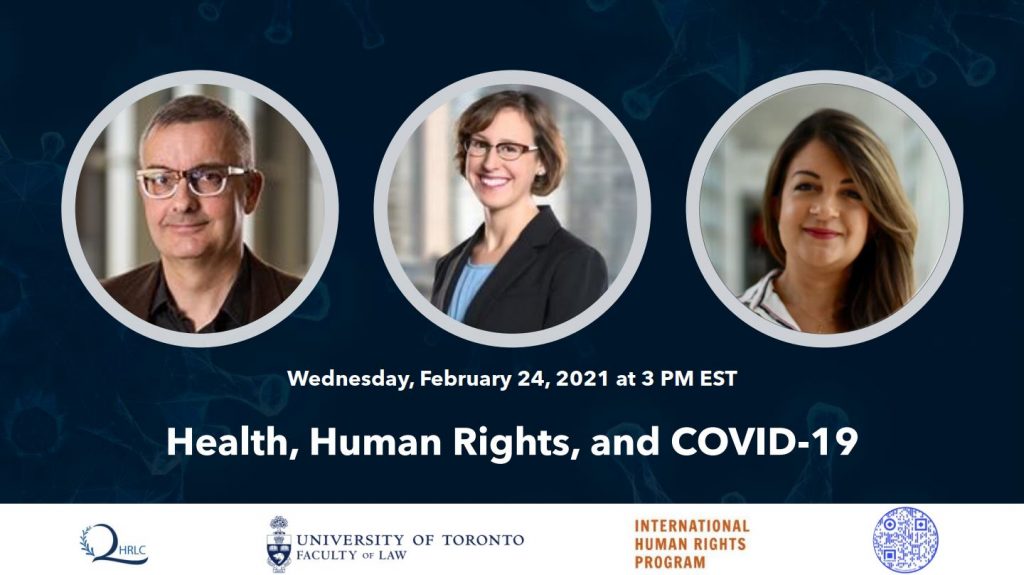A discussion on the intersection of human rights and public health

As we approach the anniversary of the COVID-19 lockdowns in Canada that shook the country last year, it is important to reflect on what we’ve learned in one year of living through a global pandemic.
The recent panel by the Global Health and Human Rights working group at the IHRP on health, human rights, and COVID-19 sought to do just that. After covering a range of topics from the use of police powers, to International Health Regulations, to disability rights in the context of COVID-19, the common thread is clear: the world’s response to COVID-19 has been needlessly lacking in both its effectiveness and its protection of human rights.
Robin Nobleman, an adjunct professor at the University of Toronto Faculty of Law and Staff Lawyer at HIV and AIDS Legal Clinic Ontario, spoke on the use of police powers during the pandemic and the lessons learned from the criminalization of HIV. New municipal ordinances across Canada have given police the power to fine citizens for breaching pandemic restrictions. Tickets have amassed in the thousands, totaling millions of dollars in fines.
However, whether this means of regulation is preferable is questionable. Fines tend to be targeted at marginalized groups, like the homeless who don’t aim to purposely ignore restrictions, but rather lack the means to obey them. When it comes down to it, criminal law tends not to be an effective means of enforcing public health measures. Criminalization punishes non-disclosure of illness but not ignorance of the law, thereby disincentivizing testing and preventing treatment and leading to an increased risk of transmission on the whole. It also reinforces many of the problems in policing — such as discriminatory and racialized patrolling — while simultaneously lumping the health sector into the mix and reducing trust in public health services.
To make matters worse, provincial public health laws have been used to bolster policing at the cost of individual privacy. In one instance, Ontario established a database of positive COVID-19 cases accessible by first responders at all times. This initiative is intended to protect first responders by alerting them to potential cases in the course of their duties. However, this measure is not only a lackluster protective measure but prone to abuse from the users. Evidence suggests police misused the database, accessing it thousands of times in regions where there were as few as 100 cases.
A better approach would include more voluntary measures, rather than coercive ones. Nobleman emphasized that human rights and public safety do not have to conflict with each other. Rather, respect for human rights can make public health interventions more effective.
Roojin Habibi, an international lawyer, consultant, and research fellow specializing in global health law, governance, and justice echoed this sentiment in her discussion of International Health Regulations (IHR). Habibi laid out the framework and drawbacks of IHR. IHR is a binding instrument of the World Health Organization and can be thought of as a treaty that comes into play during international public health emergencies.
Although there is a capacity to create international legislation using IHR, the WHO prefers to act through soft law like guidelines and non-binding recommendations. Habibi spoke to the possible evidence-based limitations that IHR can place on certain freedoms like privacy and freedom of movement, if specific criteria are met. That being said, despite being ratified by over 190 states, IHR-stipulated obligations are not often met.
Moreover, IHR has done little in terms of the COVID-19 pandemic, and it seems lessons from previous epidemics like AIDS and SARS have not been taken to heart. When thinking of IHR, the question becomes how to make measures more effective, with one potential route being to coordinate with other WHO agencies — such as animal and environmental health groups — to tackle the interwoven issue of global health. As it stands, Habibi explains that not enough effort and planning were put into initial COVID-19 measures, and these effects will be felt down the road.
Trudo Lemmens, a professor at the University of Toronto Faculty of Law, provided some poignant examples of poorly thought-out COVID-19 measures in his talk on disability rights. He argued that the rights of the public can sometimes exclude the needs of already disadvantaged groups, particularly persons living with disabilities, socially isolated individuals, and low-income individuals. For instance, the initial restrictions against visitors for long-term care homes actually exacerbated COVID-19 deaths in this setting. On top of socially isolating the elderly from their families, many of these facilities relied on patients’ family members to function properly. Without their support, additional personnel were brought in and moved between facilities, increasing the spread of COVID-19.
Other problems can be seen in the clinical triage process, where private committees decide how resources like ventilators will be distributed. These committees aren’t likely to include people from disadvantaged groups, and so they tend to ignore the elderly and people with disabilities, focusing instead on long-term survival. Although debates have adjusted this somewhat, policies are still largely created without any public feedback on priorities. Lastly, Lemmens warned that economic hardship and social isolation have led to greater reliance on medically assisted death. Instead of getting necessary treatments, marginalized groups are singled out and potentially incentivized to end their lives early.
When it comes to protecting global health and human rights, it seems we still have a long way to go. However, it isn’t all bad; COVID-19 is but another learning opportunity. The challenge now is not to just go back to normal but rather to reach a situation where we increase our prioritization of human rights. We need more cooperation between countries, not just lip service. We need to recognize that pandemics are both a medical and social phenomenon. Whether it be housing, employment, or income, social issues exacerbate health issues, and we all feel the effects.
A version of this article appears on Rights Review’s website here.





